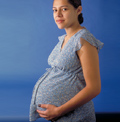 Pregnant women should be the top priority for seasonal flu vaccination, according to a new report by experts at the World Health Organization (WHO).
Pregnant women should be the top priority for seasonal flu vaccination, according to a new report by experts at the World Health Organization (WHO).
The advice is expected to prompt a rethink of immunisation policies across Europe where a large number of countries are not actively targeting this key group.
Previous WHO guidelines, dating back to 2005, included pregnant women as a risk group but prioritised older people living in residential nursing homes.
Pregnant women have now (metaphorically!) leapfrogged older people, children, health workers and people with chronic diseases to become the number one target for annual flu vaccine programmes.
The change is due to new evidence showing sufficient safety and effectiveness in protecting pregnant women and their babies from potentially devastating flu infections.
New science, new guidelines
Dr Caroline Brown of the WHO Regional Office for Europe says the expert group looked at the latest evidence on feasibility, severity, effectiveness, and indirect benefits of seasonal flu immunisation and concluded that pregnant women should be the top priority for inactivated seasonal flu vaccination.
A survey by the WHO shows that national recommendations on flu vaccination during pregnancy are mixed across Europe. Dr Brown acknowledged that vaccination during pregnancy is a potentially sensitive issue but she stressed that pregnant women are not a new target group.
The latest seasonal flu recommendations also highlight the need to target healthcare workers, children aged six to 59 months, the elderly, and those with high-risk conditions.
“Countries with existing influenza vaccination programmes targeting any of these groups should continue to do so and incorporate immunisation of pregnant women into such programmes,” Dr Brown told the ESWI Flu Summit in Brussels.
US vaccinating pregnant women
Dr Litjen Tan, co-chair of National Influenza Vaccine Summit and Director of Medicine and Public Health at the American Medical Association, said pregnant women have been a key target group in the US for several years.
The US now recommends universal seasonal influenza vaccination for anyone older six months of age and also makes a special effort to ensure pregnant women are aware of the value of vaccination.
Dr Tan said research has shown than pregnant women are five times more likely to be vaccinated if they receive recommendation from doctor.
Europe investing in research
Prof Ab Osterhaus of Erasmus Medical Centre in Rotterdam said there is considerable variation in vaccination guidelines across Europe as the detail of national immunisation programmes cannot be decided at EU level.
Helmut Walerius of the European Commission’s health directorate said EU governments had committed to improving uptake of the seasonal influenza vaccine and to communicate with health professionals about immunisation.
He described vaccination as “one of the most cost-effective public health measures you can take”, adding the EU will continue to invest in immunisation research.
Mr Walerius also noted that the European Commission is developing a system which would allow national governments to opt-in to joint procurement of vaccines. This would help to improve equality of access to vaccines, he said.
Read more about the report of the WHO’s Strategy Advisory Group of Experts (SAGE) on immunisation
<iframe width=”560″ height=”315″ src=”https://www.youtube.com/embed/GUNzEsHEMv8″ frameborder=”0″ allow=”autoplay; encrypted-media” allowfullscreen></iframe>





VaccinesToday (@VaccinesToday) (@VaccinesToday) (@VaccinesToday) (@VaccinesToday)
June 5th, 2012
#Pregnancy: the new flu vaccine priority http://t.co/oQKjB0Pm @WHO_Europe @ECDC_EU #vaccines #parenting #influenza
Ponchanok RNaBhuket (@tapanok) (@tapanok) (@tapanok)
June 5th, 2012
Pregnancy: the new flu vaccine priority
http://t.co/WQFI3i8k
Dr John Weiner (@AllergyNet)
June 6th, 2012
Pregnant women have more illness/death from flu MT @VaccinesToday Pregnancy: fluvax priority http://t.co/gqUFMYFp via @JulieLeask
Angus Thomson (@ThomsonAngus) (@ThomsonAngus)
June 6th, 2012
Pregnancy: the new flu vaccine priority http://t.co/NqeKUt1e via @vaccinestoday #everymothercounts #maternalhealth
Dan Bowen (@gracenglorydan) (@gracenglorydan)
August 1st, 2012
Pregnancy: the new flu vaccine priority http://t.co/kEW9rOIm via @vaccinestoday
Dan Bowen (@gracenglorydan) (@gracenglorydan)
August 1st, 2012
Our campaign this yr: “1 jab. 2 lives!” – “@VaccinesToday: #Pregnancy – the new #flu #vaccine priority group for WHO http://t.co/S4WPN8QF
Liz Power (@LizzyPower)
August 14th, 2012
Pregnancy: the new flu vaccine priority http://t.co/dDE5ESQb via @vaccinestoday